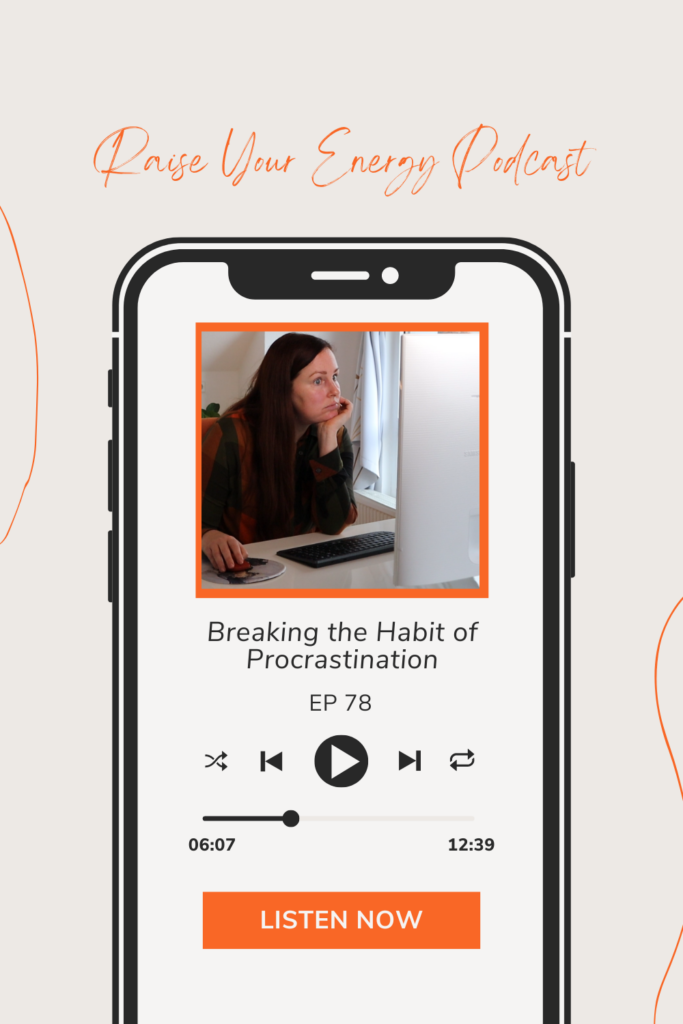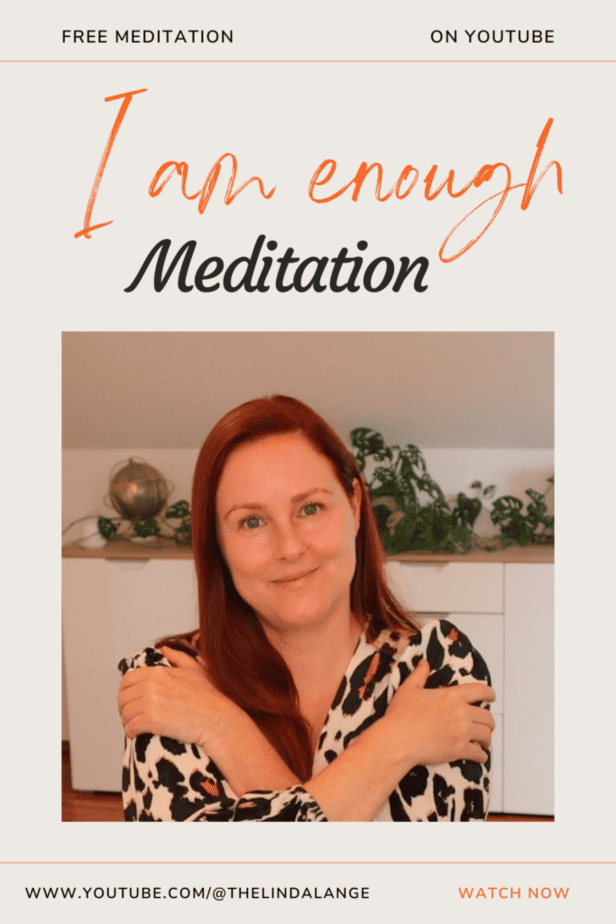Breaking the Habit of Procrastination E78
January 24, 2023

SUBSCRIBE TO THE PODCAST: Apple Podcasts | Spotify | Google Podcast | Goodpods
Do you procrastinate? And are you sick and tired of it? Then keep reading as I will share with you a secret weapon to breaking the habit of procrastination.
RATHER WATCH THAN LISTEN/READ? CLICK PLAY!
This post may contain affiliate links, which means I may receive a commission, at no extra cost to you, if you make a purchase through a link. Please see my full disclosure for further information.
Let me, first of all, say this: You are not a procrastinator. You have a habit of procrastinating. There is a huge difference!
Procrastination is a habit. Like your coffee in the morning, checking your email inbox a couple of times per hour or having to fall asleep in a particular way.
It is a behaviour that you have used at some point in your past and kept doing regularly until it became a habit. Because it’s a habit it means that you don’t consciously have to think about it using it or switching it on. It’s an automated program that gets triggered regularly.
The habit of procrastination can be changed
The good news is that a habit can be changed. It can be deprogrammed out of your subconscious. Yes, it takes some attention and energy but it is possible.
Today I don’t want to focus on how we break a habit in general but I want to specifically focus on one reason why we created the habit of procrastination in the first place. And becoming aware of this reason is already a huge step towards breaking this habit.
There are several reasons why we procrastinate and there are lots of resources out there to find them all out.
The connection between procrastination and emotions
I am going to talk to you about one of those reasons which was the most important to me personally and I think it applies to a lot of other people. And that is the connection between the habit of procrastination and the habituated emotions that are triggered when we procrastinate. What do I mean by that?
In a nutshell: Procrastination is just a habit that is triggered and fueled by another habit. And that is a habit of an emotion. In the same as we can create habits around our actions, behaviours, and mannerisms, we create habits of emotions or feelings.
It works the same way as I described before: It’s a feeling that you had at some point in your past for the first time and then you kept having the same feeling regularly until it became a habit. And like with the procrastination habit, it’s an automated program.
The habit of emotions triggering the procrastination
Your body and subconscious mind have become used to feeling this feeling. And it likes what it knows. So your body and subconscious mind will want to keep having this feeling and it might just be using procrastination to get it. So let’s talk about the emotions that might be fuelling the habit of procrastinating.
Trigger #1: Not being good enough
The first emotion that you might be habituated to is the feeling that you are not good enough. You might think you procrastinate and then you don’t feel good enough because you judge yourself and criticise yourself for procrastinating. But really, you have a habit of feeling not good enough and for your body to experience this emotion it uses procrastination.
So it’s not just that you have a habit of procrastination to break but as well a habit of feeling not good enough that you want to change. If you are aware of it, it will make the breaking of either of those habits easier.
Our core reason or purpose for doing most things is that we want to feel a particular way. And when you look behind an action or behaviour there is either an emotion you try to avoid or an emotion you try to create.
In this case, your body has created a habituation of feeling not enough. And it wants its regular dose of this feeling. So procrastinating is perfect for it. You procrastinate, then you are rushed to meet the deadline, and you might even fail – and there it is. You judge yourself, you criticise yourself and there is the feeling of not feeling good enough.
Trigger #2: Feeling unworthy and not deserving
The other emotions that are fairly similar are not feeling worthy or deserving of something. That applied more to me when I procrastinated in the past. I would beat myself up for procrastinating. I would question if I am a good manager or a good employee if I keep procrastinating instead of just getting the job done.
Procrastinating really gave me the chance to criticise myself and be upset with myself. So I had the habit of not feeling worthy of something better, I played it small and procrastinating for no particular reason helped me with that.
Trigger #3: Rush of energy from the stress response
Another common reason for procrastinating is for people to feel the chemicals of stress. That rush of energy that gets released when you are stressed and in a fight or flight mode. Your body can get used to getting this regularly and your subconscious mind is much stronger than your conscious mind.
So you have a program inside of your subconscious mind that wants to run regularly because you got used to getting this hit of stress energy. Like you want your tea or coffee in the morning. How can you get this hit of stress?
The inner monologue of a procrastinating subconscious
This is how the inner monologue of your subconscious mind might sound: Oh wait, I can procrastinate on something. So let me now do something else instead of what I planned to do and then later when I run out of time getting it done, I will get the hit of stress energy that I so got used to. I don’t need it but I like it. Is it good for me? Who cares! I just want what I have always gotten so far.
How to break the habit of procrastination
So what to do about it? You want to create clarity for yourself why you are procrastinating. So investigate how you feel when you are thinking about either that you are procrastinating or when you are feeling rushed to get things done. What is that regular emotion that you can identify in most of these instances?
And be honest with yourself. If you are not honest about this, you are not getting to the root cause. and that emotional root cause is a great secret weapon for you to break the habit of procrastination or at a minimum decrease it from happening.
And when you identified that reason or that underlying emotion, see it as a habit that you want to stop. I talk about how to change so many of my episodes. It’s all about being aware, catching yourself and then changing the feeling.
And every time you break the cycle of that emotion and the procrastination, you have won and you will break the cycle next time quicker. And every time you break the habit, it begins to weaken. Over time you will procrastinate less and less until it’s mostly gone. And over time you will feel less unworthy, or better said, more worthy and deserving. So it’s a win, win!
I FEEL ENOUGH Meditation for free
If you do think that your procrastination has to do with feelings of not being good enough or unworthiness and not deserving, I have a meditation that helps you to deprogram that thinking and feeling and instil thoughts and feelings of worthiness, being enough and deserving into your subconscious. And the best is it’s a free meditation so go to the link in the show notes or below this video to begin to break that habit.
Thank you so much for reading this blog post. I hope I shine a light on the habit of procrastination as well as the lingering habituated emotion that is quite often behind our habits. And that can be the key to breaking the habit once and for all.
Two easy ways to show your appreciation!
If you found value in today’s episode, here’s what you can do to show your support:
First, consider making a donation to the podcast. Every little bit helps to cover the costs of producing and hosting the show. And ensures that I can continue to bring you the latest insights and opinions on the topic of energy and improving your life.
Second, leave a rating and review on Apple Podcasts. This helps boost the podcast’s visibility and attract new listeners, which helps me create more tailored content for you to enjoy.
So whether you choose to donate, leave a rating and review, or both, know that you’re an integral part of my vision. You are helping everyone who struggles with burnout or high-stress levels to experience how awesome their life can be. So, thank you for your support!
You Might Also Like
- Racing thoughts stop you from falling asleep? Try this! Episode 108
- What causes All-or-Nothing thinking? Episode 103
- 5 Ways to Restart a Day Gone Wrong Episode 98
Free Meditation: I Am Enough
This meditation is for you if you have feelings of unworthiness and feelings that you are not enough.
I am guiding you to transform these feelings so you can begin to move into a state of worthiness and receive everything you wish for in your life.
I’ve created two versions for you to choose from based on how you are feeling and how much time you have: 25-Minute OR 15-Minute.
Follow me on social media
